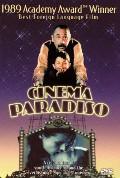
Directed by
Giuseppe Tornatore
120 minutes
Rated M
Reviewed by
Bernard Hemingway

Cinema Paradiso
Although Giuseppe Tornatore’s Fellini-esque paean to the golden years of cinema and story of a young man growing up in a provincial Sicilian town is a lushly romanticised affair that with the help of Ennio Morricone's almost uninterrupted score unapologetically mines oft-seen stereotypes, if that sort of thing doesn’t grate too seriously on you it is a skillfully made and winning film. It was, almost needless to say, a canny commercial strategy, the film being a huge internationally popular success and picking up the Best Foreign Film Oscar.
Cinema Paradiso is story of 'Totò (played as young boy by Salvatore Cascio) whose father has died in WWII and who attaches himself to Alfredo (Philippe Noiret with dubbed dialogue), the projectionist at the town's cinema. Totò is mesmerized by the dreams of cinema and wants to do Alfredo’s job, something which he gets to do after a fire in the projection booth leaves Alfredo blind. Fast forward ten years and after an unhappy love affair, Totò (Marco Leonardi) leaves for Rome where he becomes a successful film director. It is from the perspective of the adult Totò (Jacques Perrin) that the story is told in flashback.
The first part of the film which deals with the relationship between Totò and the old projectionist is the film’s main calling card. Cascio (he appeared in a handful of films after this) is a cute kid and the near fairytale dynamic between him and Noiret is appealing. Add in the rusticated Sicilian locations, a gaggle of lovable or otherwise colourful characters, all mad for the talking pictures, and clips from a swag of movies ranging from Hollywood Westerns to Italian Neo-realismo films and you have a winning combination, albeit a heavily sentimentalized one. Even allowing that this is due to effectively being the rosy-hued memories of the adult Totò, when the nine-year old boy single-handedly saves Alfredo from the burning cinema and then gets the job as projectionist our credulity is stretched to breaking point.
Our sympathies are further tested in the second act. Tornatore carries through the same general elements but the magical effect of young Totò’s wide-eyed enchantment is lost when the quirky young Totò turns out to be a young man with male model good looks who spends his days smitten with desire for, of course, the most beautiful girl (Agnese Nano) in the town. It a rather conventionally bland interlude before the closing act in which the adult Totò returns for Alfredo’s funeral (given that Totò is now in his forties Alfredo must have lived to a ripe old age). Although this section is marred by some very dodgy attempts to age the characters with whitened whiskers and bald pates it also contains one of the most effective scenes when Totò plays a reel of all the scenes of passionate kissing that the parish priest had ordered cut out of the films.
For all its sentimentality, ultimately it is as homage to the romance and magic of film that Cinema Paradiso speaks to us and it does so charmingly.
FYI: There is a 170 minute “Director’s Cut” version which restores re-iterative footage wisely cut from the original theatrical release without in any notable way affecting the narrative.
DVD Extras: Umbrella Entertainment's commendable four disc set includes two versions of the film; the 120 minute theatrical cut and the 170 minute director's cut. You also get the 52 minute documentary Giuseppe Tornatore: A Dream of Sicily and the theatrical trailer as well the CD of Ennio Morricone's score.
Available from: Umbrella Entertainment
Want something different?





